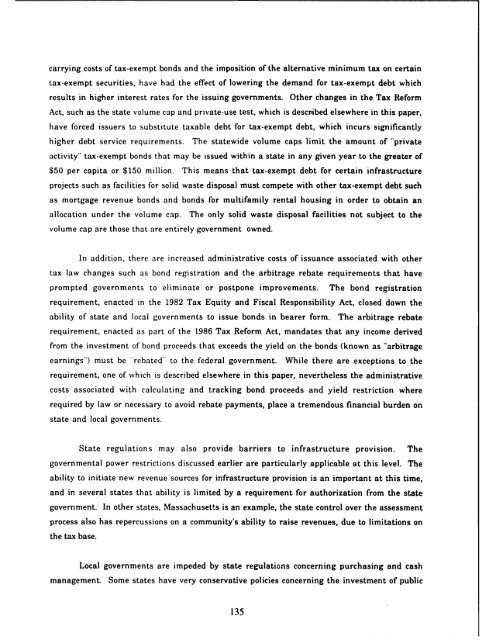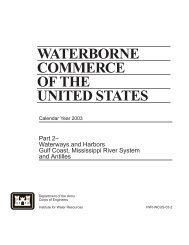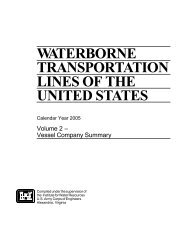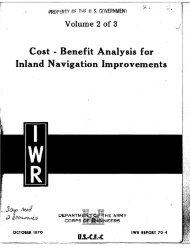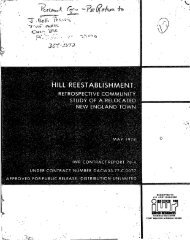Challenges and Opportunities for Innovation in the Public Works ...
Challenges and Opportunities for Innovation in the Public Works ...
Challenges and Opportunities for Innovation in the Public Works ...
Create successful ePaper yourself
Turn your PDF publications into a flip-book with our unique Google optimized e-Paper software.
carry<strong>in</strong>g costs of tax-exempt bonds <strong>and</strong> <strong>the</strong> imposition of <strong>the</strong> alternative m<strong>in</strong>imum tax on certa<strong>in</strong><br />
tax-exempt securities, have had <strong>the</strong> effect of lower<strong>in</strong>g <strong>the</strong> dem<strong>and</strong> <strong>for</strong> tax-exempt debt which<br />
results <strong>in</strong> higher <strong>in</strong>terest rates <strong>for</strong> <strong>the</strong> issu<strong>in</strong>g governments. O<strong>the</strong>r changes <strong>in</strong> <strong>the</strong> Tax Re<strong>for</strong>m<br />
Act, such as <strong>the</strong> state volume cap <strong>and</strong> private-use test, which is described elsewhere <strong>in</strong> this paper,<br />
have <strong>for</strong>ced issuers to substitute taxable debt <strong>for</strong> tax-exempt debt, which <strong>in</strong>curs significantly<br />
higher debt service requirements. The statewide volume caps limit <strong>the</strong> amount of "private<br />
activity" tax-exempt bonds that may be issued with<strong>in</strong> a state <strong>in</strong> any given year to <strong>the</strong> greater of<br />
$50 per capita or $150 million. This means that tax-exempt debt <strong>for</strong> certa<strong>in</strong> <strong>in</strong>frastructure<br />
projects such as facilities <strong>for</strong> solid waste disposal must compete with o<strong>the</strong>r tax-exempt debt such<br />
as mortgage revenue bonds <strong>and</strong> bonds <strong>for</strong> multifamily rental hous<strong>in</strong>g <strong>in</strong> order to obta<strong>in</strong> an<br />
allocation under <strong>the</strong> volume cap. The only solid waste disposal facilities not subject to <strong>the</strong><br />
volume cap are those that are entirely government owned.<br />
In addition, <strong>the</strong>re are <strong>in</strong>creased adm<strong>in</strong>istrative costs of issuance associated with o<strong>the</strong>r<br />
tax law changes such as bond registration <strong>and</strong> <strong>the</strong> arbitrage rebate requirements that have<br />
prompted governments to elim<strong>in</strong>ate or postpone improvements. The bond registration<br />
requirement, enacted <strong>in</strong> <strong>the</strong> 1982 Tax Equity <strong>and</strong> Fiscal Responsibility Act, closed down <strong>the</strong><br />
ability of state <strong>and</strong> local governments to issue bonds <strong>in</strong> bearer <strong>for</strong>m. The arbitrage rebate<br />
requirement, enacted as part of <strong>the</strong> 1986 Tax Re<strong>for</strong>m Act, m<strong>and</strong>ates that any <strong>in</strong>come derived<br />
from <strong>the</strong> <strong>in</strong>vestment of bond proceeds that exceeds <strong>the</strong> yield on <strong>the</strong> bonds (known as "arbitrage<br />
earn<strong>in</strong>gs") must be "rebated" to <strong>the</strong> federal government. While <strong>the</strong>re are exceptions to <strong>the</strong><br />
requirement, one of which is described elsewhere <strong>in</strong> this paper, never<strong>the</strong>less <strong>the</strong> adm<strong>in</strong>istrative<br />
costs associated with calculat<strong>in</strong>g <strong>and</strong> track<strong>in</strong>g bond proceeds <strong>and</strong> yield restriction where<br />
required by law or necessary to avoid rebate payments, place a tremendous f<strong>in</strong>ancial burden on<br />
state <strong>and</strong> local governments.<br />
State regulations may also provide barriers to <strong>in</strong>frastructure provision. The<br />
governmental power restrictions discussed earlier are particularly applicable at this level. The<br />
ability to <strong>in</strong>itiate new revenue sources <strong>for</strong> <strong>in</strong>frastructure provision is an important at this time,<br />
<strong>and</strong> <strong>in</strong> several states that ability is limited by a requirement <strong>for</strong> authorization from <strong>the</strong> state<br />
government. In o<strong>the</strong>r states, Massachusetts is an example, <strong>the</strong> state control over <strong>the</strong> assessment<br />
process also has repercussions on a community's ability to raise revenues, due to limitations on<br />
<strong>the</strong> tax base.<br />
Local governments are impeded by state regulations concern<strong>in</strong>g purchas<strong>in</strong>g <strong>and</strong> cash<br />
management. Some states have very conservative policies concern<strong>in</strong>g <strong>the</strong> <strong>in</strong>vestment of public<br />
135


